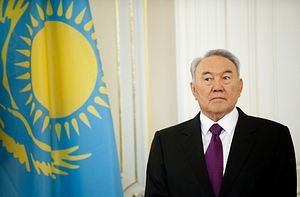It took nearly 20 years, but this week the World Trade Organization (WTO) formally approved Kazakhstan’s membership. Uniquely, Kazakhstan’s commitments will also bind Eurasian Economic Union members. They Kazakh parliament has until the end of October to ratify the agreement and there’s no indication it won’t do so. Kazakhstan has long been Central Asia’s dominant economy—with a GDP of over $230 billion—its membership in the global organization that regulates international trade makes sense.
As I wrote in June when negotiations were completed, WTO membership fits into Kazakhstan’s larger strategic plans to elevate both its economy and its international standing. In an op-ed published in The Diplomat, Kazakh Foreign Minister Erlan Idrissov wrote that WTO membership, in addition to several other initiatives, “underlines the country’s commitment to building a world-class and diversified economy.”
In the past few years, negotiations were held up by complexities relating to Kazakhstan’s membership in the Eurasian Economic Union (EEU, also sometimes abbreviated as EAEU). In June, the WTO announcement that the accession package was ready for a vote merely stated that tariff adjustments to resolve differences between Kazakhstan’s other commitments–to the EEU and bilaterally with Russia–was the “principal hurdle in completing Kazakhstan’s market access negotiations.”
Kazakhstan’s agreements include lowering tariffs on goods to an average of 6.1 percent. Tariffs on agricultural products are higher, at 7.6 percent (and lower for non-agricultural products at 5.9 percent). While the agricultural industry pales in comparison to oil and gas in contributing to GDP, it is certainly a core industry for employment–a quarter of the Kazakh workforce is employed in agriculture. With regard to export duties, Kazakhstan agreed to bind duties for 370 tariff lines, 55 of which are bound at zero percent and “If and when a common Eurasian Economic Union (EAEU) policy on export duties is implemented, Kazakhstan will also be bound by the list of commitments of the Russian Federation on export duties.”
According to documents released by the WTO:
A unique aspect of Kazakhstan’s rules commitments is the extent of accession specific commitments “accepted” by Kazakhstan, which shall be applicable to and bind the EAEU and its member States on matters falling under the competence of the EAEU. There are 23 commitments which contain measures to be undertaken by “Kazakhstan and/or the competent bodies of the EAEU”.
Russia, which acceded to the WTO in 2012, previously held the record for longest membership negotiations–19 years, 2 months and is the subject of sanctions from the West relating to Moscow’s adventurism in Ukraine. Russia also leads, for all intents and purposes, the EEU. It seems that EEU policies, whenever those are delineated, will need to fit inside the WTO rules.
Kazakh President Nursultan Nazarbayev used his remarks at the ceremony Monday to highlight Kazakhstan’s progress and ambitions. Kazakh’s economy, he said “has become more robust and open,” its GDP has experienced an 18-fold increase and the country does business with 185 states around the world. Nazarbayev says “the European Union countries are the main economic partners” for the country, accounting for 40 percent of trade. He then notes that structurally, Kazakhstan’s economy has evolved and that country has significantly enhanced its capacity for investment.
While Nazarbayev certainly went to lengths to highlight his country’s attractiveness to and involvement with Europe–he by no means threw Russia under the proverbial bus. According to Tengrinews, Nazarbayev commented that “A major principle of the WTO is to facilitate discrimination-free trade among its member states (…) the policy of sanctions currently in place does not differentiate between economy and politics, hampering trade, and does not comply with the WTO norms. Our joint task is to prevent such things from happening.”
Regionally, only Turkmenistan and Uzbekistan still remain outside the WTO.
































